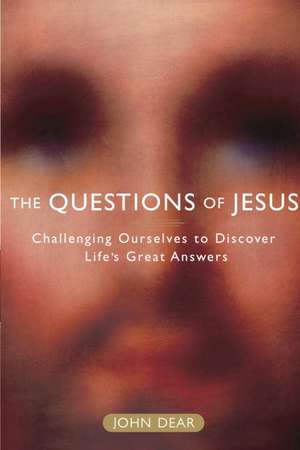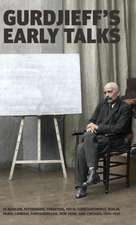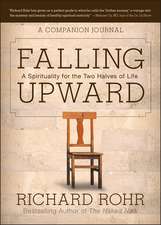The Questions of Jesus: Challenging Ourselves to Discover Life's Great Answers
Autor John Storeyen Limba Engleză Paperback – 31 oct 2004
The Gospels are filled with stories, parables, miracles, commandments, and dramatic incidents that trace Jesus’ life and recount his teachings. A close reading of the Gospels reveals, however, that they are also filled with questions. As John Dear points out in this remarkable book, Jesus, like any great teacher and rabbi, “has a question for everyone he meets, for every occasion, for every experience, for every potential disciple.” Dear uses these questions as a starting point, an invitation to readers to discover the lessons they contain by searching their own hearts and minds for answers.
Throughout The Questions of Jesus, Dear interweaves insights from ethical and religious teachers ranging from Buddha to Gandhi to Martin Luther King, Jr. Using recent events as powerful and poignant examples, he shows why a renewed commitment to Jesus’ message of nonviolence, compassion, justice, and peace is essential to healing a world torn by violence and war.
Preț: 122.76 lei
Nou
Puncte Express: 184
Preț estimativ în valută:
23.49€ • 24.53$ • 19.44£
23.49€ • 24.53$ • 19.44£
Carte disponibilă
Livrare economică 15-29 martie
Preluare comenzi: 021 569.72.76
Specificații
ISBN-13: 9780385510073
ISBN-10: 0385510071
Pagini: 336
Dimensiuni: 140 x 208 x 18 mm
Greutate: 0.36 kg
Ediția:Image Books.
Editura: IMAGE
ISBN-10: 0385510071
Pagini: 336
Dimensiuni: 140 x 208 x 18 mm
Greutate: 0.36 kg
Ediția:Image Books.
Editura: IMAGE
Notă biografică
John Dear is a priest, retreat leader, author, and peace activist. He has served as the executive director of the Fellowship of Reconciliation, an interfaith peace organization, and as a Red Cross coordinator of chaplains at the Family Assistance Center in New York City after the September 11, 2001 attacks. He has traveled to the world's war zones on missions of peace, has been imprisoned repeatedly for civil disobedience against war, and has been featured in the New York Times, the Washington Post, NPR's All Things Considered, USA Today, and the National Catholic Reporter. He lives in northeastern New Mexico.
Extras
ONE
INVITATION
What are you looking for?
(JOHN 1:38)
What are you looking for?"
The first question Jesus asks does not address our sins, failures, or infidelity. It is not accusatory or hostile. Rather, it is a question rooted in compassion and love, calling upon our deepest desires, the best within us. It is a question full of hope.
"What are you looking for?"
John's Gospel begins when John the Baptist tells two of his disciples that Jesus is the Messiah. "Behold the Lamb of God who takes away the sins of the world," he says, pointing to Jesus. The two disciples immediately begin following Jesus. When he notices these two followers, Jesus turns around, looks them in the eye and asks, "What are you looking for?" He does not reject them. From the start, he is interested in them. He draws them out. He gets them to articulate their hopes and dreams. He is willing to listen to them. He shows them loving kindness.
Those first disciples are caught off guard by Jesus' disarming question. So they ask him a question. "Where are you staying?" Always inviting, Jesus welcomes them into his life. "Come and see," he says to them.
What is it we are looking for in our lives? A good place to begin our daily meditation is to sit in silent peace with the holy desires within us, and to imagine Jesus looking at us with loving kindness and asking, "What are you looking for?"
What would we say to Jesus? As we look at him, as we feel his sincerity and love, and as we notice his lack of judgment or anger, we can let those deep desires surface and be spoken. Seeing the love in his eyes, we know that he will not laugh at or reject us. We know that the best within us comes from God, that God has given us everything that is holy within us, and that he will affirm whatever holy desires we seek.
What is it we want? What do we truly desire? Life is short and precious. What are we most looking for in the remaining years we have left? If we can sit with his question for days and weeks, we will discover, perhaps to our astonishment, that we are not looking for money, power, fame, or control. We are really looking for love, goodness, truth, peace, happiness, justice, mercy, and joy. We are looking for meaning. We are looking for God. We are looking for Jesus.
St. Ignatius Loyola, the founder of the Jesuits, knew, even in the sixteenth century, the importance of holy desires. He taught that every time we pray we should ask God to give us "what it is we are looking for." The Buddhist monks of Tibet also recognize the spiritual wisdom of knowing what it is we seek. For thousands of years, their dharma was based in the understanding that the spiritual life begins by naming what we truly want.
Our deepest desires hold great power. If we can name them, unleash their goodness, and channel those desires toward God, then our lives will be transformed. We will begin a journey toward God, into the mystery and peace of God, and become servants and friends of God.
If we listen to Jesus' question, name the pure, selfless, loving desires that lie buried in our hearts, and tell Jesus what we are looking for, he will listen and beckon us into a whole new life where those holy desires will be realized. If we dare say that we are looking for him, that we want to be with him, that we want to follow him, we can trust that he will invite us to join him on his journey and lead us to where he lives.
Why are you looking for me?
(LUKE 2:49)
According to Luke's Gospel, when Jesus is twelve years old, he goes with his parents on the annual pilgrimage to Jerusalem. Afterward, he stays behind without his parents knowing it. When they realize he is not in their caravan, they return to Jerusalem in a panic, searching everywhere for their boy.
After three days, they find Jesus in the Temple, where he sits "in the midst of the teachers, listening to them and asking them questions." Already at his young age, Jesus behaves like a rabbi, listening and asking questions. "All who heard him were astounded at his understanding and his answers," Luke reports.
"Son, why have you done this to us?" his mother asks. "Your father and I have been looking for you with great anxiety." The poor parents are worried, stressed out, and angry. They probably feared that something terrible had happened to Jesus, perhaps that he had been kidnapped or killed. But they do not respond with corporal punishment, verbal abuse, or humiliation. Rather, Jesus' mother asks a simple yet serious question.
But Jesus has just spent three days arguing the fine points of the Scriptures with the highest religious leaders in the holiest place on earth. Although he is just twelve, he has already become a spellbinding teacher, an extraordinary rabbi who listens, asks questions, and gives remarkable answers. So Jesus in return asks his parents a pointed question: "Why are you looking for me?"
Luke records that his parents do not understand what Jesus is saying, but that he returns home with them.
It's a good question. If we sit with it, we may hear Jesus' desire to know what motivates us--and we may find ourselves, likewise, unable to answer.
Over a billion people claim to be followers of Jesus. More books have been written about Jesus than any other person in history, and more books have appeared about Jesus in the past thirty years than ever before in history. In recent years, portraits of his face have appeared on the cover of nearly every major U.S. magazine.
Why are we looking for Jesus? Each one of us has a different answer. We look for Jesus because he is the most authentic person who ever lived. We look for Jesus because we feel his compassion for us. We look for Jesus because in his humility, suffering, forgiveness, and death, we see pure selfless love. We look for Jesus because deep down we believe he is alive, that the resurrection is true, and that he will help us through our personal brokenness and global catastrophes. We look for Jesus because we hunger and thirst for God and we believe that he embodies God.
In the end, we may say simply, "Jesus, we are looking for you because we love you, we need you, and we want to be with you."
What do you want me to do for you?
(MATTHEW 20:32; MARK 10:36 AND 10:51; LUKE 18:41)
The most frequently asked of Jesus' questions is also the most beautiful: "What do you want me to do for you?"
In Matthew's account (20:32), the mother of James and John approaches Jesus and bows down in homage before him. "What do you wish?" Jesus asks her. In Mark's version (10:35), James and John themselves approach Jesus and say boldly, "Teacher, we want you to do for us whatever we ask of you." Their selfishness does not faze Jesus. "What do you want me to do for you?" he asks them. In both cases, James and John want to sit by his side in heaven. They want to be in control, to dominate, to be God. But Jesus says that position is "not mine to give."
But Mark's Jesus keeps asking the question. In the next scene, Jesus hears a blind beggar named Bartimaeus call out to him, "Jesus, Son of David, have pity on me." Against the disciples' protests, Jesus calls him over. Immediately, the beggar throws aside his cloak--which would have held not only all the money he had collected but constituted his sole possession. He jumps up and runs to meet Jesus. Seeing this, Jesus places himself completely at the disposal of the poor man. "What do you want me to do for you?" he asks. "I want to see," Bartimaeus says. "Go your way; your faith has saved you," Jesus answers. His sight is restored, and Bartimaeus begins to follow Jesus "on the way." Luke tells almost the same story (18:41).
In both Mark and Luke, Jesus' question to the blind beggar occurs soon after Jesus is challenged by a rich official who wants to enter eternal life as his rightful inheritance. When Jesus invites him to sell what he has, give the money to the poor, and follow him, the rich man turns away sad. Mark even records that Jesus "looked on him and loved him" as he invited him on the discipleship journey.
But it is the blind beggar who wins Jesus over and gets what he wants. The blind beggar shows us our proper disposition before Christ and his question. We too are poor, blind beggars. We too need to come before God in our brokenness, helplessness, blindness, and poverty. We too need to call out to Christ to take pity on us. If we dare renounce our egos and selfishness and beg for God's help, we too will hear God ask, "What do you want me to do for you?"
The question is beautiful because it not only shows God's desire to help us, but it reveals the very nature of God. In Jesus, we have a God who is humble, loving, and generous, a God who longs to serve humanity, especially in its brokenness, poverty, and blindness. Jesus said he came "not to be served but to serve." With this question, we see once more how serious he is.
Like all the questions of Jesus, this one requires reflection, not a hasty response. Do we want to sit beside God in heaven in powerful domination over others, like the selfish male disciples did? Do we want eternal life as if it is our rightful inheritance, as if we deserve it, as if we are the great, worthy elite? Or do we recognize our poverty, brokenness, helplessness, and blindness--our need for God, our need for vision--and want simply to see again, to see God face-to-face?
If we come before God as the broken beggars we are, we can trust that Christ will restore our vision, and, like Bartimaeus, we will see God.
TWO
IDENTITY
Who do people say that I am?
(MARK 8:27; LUKE 9:18; MATTHEW 16:13)
After some quiet prayer in a secluded spot, Jesus turns to his friends and asks them what people are saying about him. He has been denounced by the religious authorities as possessed, by his family as crazy, by demoniacs as a torturer, and by the crowds as a blasphemer. But he wants to know if his followers have any clue who he is.
"Who do people say that I am?" Mark records the question. "Who do the crowds say that I am?" we read in Luke's version. "Who do people say that the Son of Humanity is?" Matthew's account says.
Jesus tries to share his identity with everyone, but he learns early on that he cannot come out and tell people who he is. People cannot handle it. They simply cannot accept it. In many ways, neither can we. Yet, Jesus wants to know what others are saying about him to see if they have understood who he is.
The people of Jesus' time were never able to grasp who Jesus was during his lifetime. They could not comprehend his heavenly origin, and, in the end, they brutally executed him as a fraud, a charlatan, a blasphemer.
But Jesus' question is asked from a heart of love, a heart that loves everyone. Even as the people respond to his healing miracles and preaching ministry with hostility and resentment, Jesus feels only compassion for them. He continues to reach out and speak the truth to them. He never stops inviting them into the grace and light of God's reign. He is interested in their lives--in helping them, in saving them.
"Some say you are John the Baptist," the disciples answer. "Others says Elijah. Still others say you are one of the prophets." The disciples have clearly been listening to the crowds and are impressed by some of the rumors. But they themselves do not point out that the crowds are wrong. Their answers belie their own uncertainty. They do not know who Jesus is either.
Jesus' question reveals a deep self-awareness, a searching spirit, someone used to reflecting on the meaning of his life and his own identity. Jesus surely must have put the question to himself first: "Who am I? Why am I here? What am I to do? What is God's will for me?" These are questions that Jesus would have spent time with, probably after his baptism, when he first heard the voice of God call him "my Beloved." He would have pondered these questions also during his forty-day fast in the desert.
At some point, Jesus decides on an answer. He accepts and realizes that he is, indeed, God's beloved. He understands that his special identity means that he will have to treat everyone else as his own beloved. His personal identity is rooted in his intimate relationship with his beloved God, but he knows that means he has to treat the whole human race as his beloved.
Throughout his brief public life, Jesus explores his identity. In John's Gospel, he announces who he is, not as God's Beloved, as the Son of God, or as the Son of Humanity, but, in more poetic imagery, as the Light of the World, the Bread of Life, the Resurrection and the Life, the Way, the Truth, and the Life, the True Vine, the Good Shepherd, and the Gate. Such beautiful images could only emerge from deep self-reflection. Jesus must have constantly asked himself, "Who am I for others? What do they say about me?"
Jesus' search for self-understanding can inspire our own. "Who are we? What do others say about us? How does God identify me?" The more we ponder our identity and the purpose of our lives, the greater the inner peace and self-confidence we will know, and the greater the compassion and love we will be able to offer to others. Similar self-reflection will lead us to discover that we, too, are God's beloved, called to share that belovedness with every other human being and to help everyone else discover their own true identities as God's beloved sons and daughters.
INVITATION
What are you looking for?
(JOHN 1:38)
What are you looking for?"
The first question Jesus asks does not address our sins, failures, or infidelity. It is not accusatory or hostile. Rather, it is a question rooted in compassion and love, calling upon our deepest desires, the best within us. It is a question full of hope.
"What are you looking for?"
John's Gospel begins when John the Baptist tells two of his disciples that Jesus is the Messiah. "Behold the Lamb of God who takes away the sins of the world," he says, pointing to Jesus. The two disciples immediately begin following Jesus. When he notices these two followers, Jesus turns around, looks them in the eye and asks, "What are you looking for?" He does not reject them. From the start, he is interested in them. He draws them out. He gets them to articulate their hopes and dreams. He is willing to listen to them. He shows them loving kindness.
Those first disciples are caught off guard by Jesus' disarming question. So they ask him a question. "Where are you staying?" Always inviting, Jesus welcomes them into his life. "Come and see," he says to them.
What is it we are looking for in our lives? A good place to begin our daily meditation is to sit in silent peace with the holy desires within us, and to imagine Jesus looking at us with loving kindness and asking, "What are you looking for?"
What would we say to Jesus? As we look at him, as we feel his sincerity and love, and as we notice his lack of judgment or anger, we can let those deep desires surface and be spoken. Seeing the love in his eyes, we know that he will not laugh at or reject us. We know that the best within us comes from God, that God has given us everything that is holy within us, and that he will affirm whatever holy desires we seek.
What is it we want? What do we truly desire? Life is short and precious. What are we most looking for in the remaining years we have left? If we can sit with his question for days and weeks, we will discover, perhaps to our astonishment, that we are not looking for money, power, fame, or control. We are really looking for love, goodness, truth, peace, happiness, justice, mercy, and joy. We are looking for meaning. We are looking for God. We are looking for Jesus.
St. Ignatius Loyola, the founder of the Jesuits, knew, even in the sixteenth century, the importance of holy desires. He taught that every time we pray we should ask God to give us "what it is we are looking for." The Buddhist monks of Tibet also recognize the spiritual wisdom of knowing what it is we seek. For thousands of years, their dharma was based in the understanding that the spiritual life begins by naming what we truly want.
Our deepest desires hold great power. If we can name them, unleash their goodness, and channel those desires toward God, then our lives will be transformed. We will begin a journey toward God, into the mystery and peace of God, and become servants and friends of God.
If we listen to Jesus' question, name the pure, selfless, loving desires that lie buried in our hearts, and tell Jesus what we are looking for, he will listen and beckon us into a whole new life where those holy desires will be realized. If we dare say that we are looking for him, that we want to be with him, that we want to follow him, we can trust that he will invite us to join him on his journey and lead us to where he lives.
Why are you looking for me?
(LUKE 2:49)
According to Luke's Gospel, when Jesus is twelve years old, he goes with his parents on the annual pilgrimage to Jerusalem. Afterward, he stays behind without his parents knowing it. When they realize he is not in their caravan, they return to Jerusalem in a panic, searching everywhere for their boy.
After three days, they find Jesus in the Temple, where he sits "in the midst of the teachers, listening to them and asking them questions." Already at his young age, Jesus behaves like a rabbi, listening and asking questions. "All who heard him were astounded at his understanding and his answers," Luke reports.
"Son, why have you done this to us?" his mother asks. "Your father and I have been looking for you with great anxiety." The poor parents are worried, stressed out, and angry. They probably feared that something terrible had happened to Jesus, perhaps that he had been kidnapped or killed. But they do not respond with corporal punishment, verbal abuse, or humiliation. Rather, Jesus' mother asks a simple yet serious question.
But Jesus has just spent three days arguing the fine points of the Scriptures with the highest religious leaders in the holiest place on earth. Although he is just twelve, he has already become a spellbinding teacher, an extraordinary rabbi who listens, asks questions, and gives remarkable answers. So Jesus in return asks his parents a pointed question: "Why are you looking for me?"
Luke records that his parents do not understand what Jesus is saying, but that he returns home with them.
It's a good question. If we sit with it, we may hear Jesus' desire to know what motivates us--and we may find ourselves, likewise, unable to answer.
Over a billion people claim to be followers of Jesus. More books have been written about Jesus than any other person in history, and more books have appeared about Jesus in the past thirty years than ever before in history. In recent years, portraits of his face have appeared on the cover of nearly every major U.S. magazine.
Why are we looking for Jesus? Each one of us has a different answer. We look for Jesus because he is the most authentic person who ever lived. We look for Jesus because we feel his compassion for us. We look for Jesus because in his humility, suffering, forgiveness, and death, we see pure selfless love. We look for Jesus because deep down we believe he is alive, that the resurrection is true, and that he will help us through our personal brokenness and global catastrophes. We look for Jesus because we hunger and thirst for God and we believe that he embodies God.
In the end, we may say simply, "Jesus, we are looking for you because we love you, we need you, and we want to be with you."
What do you want me to do for you?
(MATTHEW 20:32; MARK 10:36 AND 10:51; LUKE 18:41)
The most frequently asked of Jesus' questions is also the most beautiful: "What do you want me to do for you?"
In Matthew's account (20:32), the mother of James and John approaches Jesus and bows down in homage before him. "What do you wish?" Jesus asks her. In Mark's version (10:35), James and John themselves approach Jesus and say boldly, "Teacher, we want you to do for us whatever we ask of you." Their selfishness does not faze Jesus. "What do you want me to do for you?" he asks them. In both cases, James and John want to sit by his side in heaven. They want to be in control, to dominate, to be God. But Jesus says that position is "not mine to give."
But Mark's Jesus keeps asking the question. In the next scene, Jesus hears a blind beggar named Bartimaeus call out to him, "Jesus, Son of David, have pity on me." Against the disciples' protests, Jesus calls him over. Immediately, the beggar throws aside his cloak--which would have held not only all the money he had collected but constituted his sole possession. He jumps up and runs to meet Jesus. Seeing this, Jesus places himself completely at the disposal of the poor man. "What do you want me to do for you?" he asks. "I want to see," Bartimaeus says. "Go your way; your faith has saved you," Jesus answers. His sight is restored, and Bartimaeus begins to follow Jesus "on the way." Luke tells almost the same story (18:41).
In both Mark and Luke, Jesus' question to the blind beggar occurs soon after Jesus is challenged by a rich official who wants to enter eternal life as his rightful inheritance. When Jesus invites him to sell what he has, give the money to the poor, and follow him, the rich man turns away sad. Mark even records that Jesus "looked on him and loved him" as he invited him on the discipleship journey.
But it is the blind beggar who wins Jesus over and gets what he wants. The blind beggar shows us our proper disposition before Christ and his question. We too are poor, blind beggars. We too need to come before God in our brokenness, helplessness, blindness, and poverty. We too need to call out to Christ to take pity on us. If we dare renounce our egos and selfishness and beg for God's help, we too will hear God ask, "What do you want me to do for you?"
The question is beautiful because it not only shows God's desire to help us, but it reveals the very nature of God. In Jesus, we have a God who is humble, loving, and generous, a God who longs to serve humanity, especially in its brokenness, poverty, and blindness. Jesus said he came "not to be served but to serve." With this question, we see once more how serious he is.
Like all the questions of Jesus, this one requires reflection, not a hasty response. Do we want to sit beside God in heaven in powerful domination over others, like the selfish male disciples did? Do we want eternal life as if it is our rightful inheritance, as if we deserve it, as if we are the great, worthy elite? Or do we recognize our poverty, brokenness, helplessness, and blindness--our need for God, our need for vision--and want simply to see again, to see God face-to-face?
If we come before God as the broken beggars we are, we can trust that Christ will restore our vision, and, like Bartimaeus, we will see God.
TWO
IDENTITY
Who do people say that I am?
(MARK 8:27; LUKE 9:18; MATTHEW 16:13)
After some quiet prayer in a secluded spot, Jesus turns to his friends and asks them what people are saying about him. He has been denounced by the religious authorities as possessed, by his family as crazy, by demoniacs as a torturer, and by the crowds as a blasphemer. But he wants to know if his followers have any clue who he is.
"Who do people say that I am?" Mark records the question. "Who do the crowds say that I am?" we read in Luke's version. "Who do people say that the Son of Humanity is?" Matthew's account says.
Jesus tries to share his identity with everyone, but he learns early on that he cannot come out and tell people who he is. People cannot handle it. They simply cannot accept it. In many ways, neither can we. Yet, Jesus wants to know what others are saying about him to see if they have understood who he is.
The people of Jesus' time were never able to grasp who Jesus was during his lifetime. They could not comprehend his heavenly origin, and, in the end, they brutally executed him as a fraud, a charlatan, a blasphemer.
But Jesus' question is asked from a heart of love, a heart that loves everyone. Even as the people respond to his healing miracles and preaching ministry with hostility and resentment, Jesus feels only compassion for them. He continues to reach out and speak the truth to them. He never stops inviting them into the grace and light of God's reign. He is interested in their lives--in helping them, in saving them.
"Some say you are John the Baptist," the disciples answer. "Others says Elijah. Still others say you are one of the prophets." The disciples have clearly been listening to the crowds and are impressed by some of the rumors. But they themselves do not point out that the crowds are wrong. Their answers belie their own uncertainty. They do not know who Jesus is either.
Jesus' question reveals a deep self-awareness, a searching spirit, someone used to reflecting on the meaning of his life and his own identity. Jesus surely must have put the question to himself first: "Who am I? Why am I here? What am I to do? What is God's will for me?" These are questions that Jesus would have spent time with, probably after his baptism, when he first heard the voice of God call him "my Beloved." He would have pondered these questions also during his forty-day fast in the desert.
At some point, Jesus decides on an answer. He accepts and realizes that he is, indeed, God's beloved. He understands that his special identity means that he will have to treat everyone else as his own beloved. His personal identity is rooted in his intimate relationship with his beloved God, but he knows that means he has to treat the whole human race as his beloved.
Throughout his brief public life, Jesus explores his identity. In John's Gospel, he announces who he is, not as God's Beloved, as the Son of God, or as the Son of Humanity, but, in more poetic imagery, as the Light of the World, the Bread of Life, the Resurrection and the Life, the Way, the Truth, and the Life, the True Vine, the Good Shepherd, and the Gate. Such beautiful images could only emerge from deep self-reflection. Jesus must have constantly asked himself, "Who am I for others? What do they say about me?"
Jesus' search for self-understanding can inspire our own. "Who are we? What do others say about us? How does God identify me?" The more we ponder our identity and the purpose of our lives, the greater the inner peace and self-confidence we will know, and the greater the compassion and love we will be able to offer to others. Similar self-reflection will lead us to discover that we, too, are God's beloved, called to share that belovedness with every other human being and to help everyone else discover their own true identities as God's beloved sons and daughters.
Recenzii
Praise for John Dear’s Living Peace
“Living Peace is a deeply moving and profoundly inspiring account of John Dear’s journey of enviable courage, boundless faith, unquestioned hope, and unconditional love.” —Martin Sheen
“In this inspiring book, John Dear proves himself the William Sloane Coffin of our day.” —Publishers Weekly
“Living Peace is a call to the reader that peace is no further away than a prayer to the Lord that He might come.” —St. Anthony Messenger
“John Dear is a bright young light in the religious peace movement. Living Peace shows the deep spiritual roots of his commitment.” —Jim Wallis, editor in chief, Sojourners
“Living Peace is a deeply moving and profoundly inspiring account of John Dear’s journey of enviable courage, boundless faith, unquestioned hope, and unconditional love.” —Martin Sheen
“In this inspiring book, John Dear proves himself the William Sloane Coffin of our day.” —Publishers Weekly
“Living Peace is a call to the reader that peace is no further away than a prayer to the Lord that He might come.” —St. Anthony Messenger
“John Dear is a bright young light in the religious peace movement. Living Peace shows the deep spiritual roots of his commitment.” —Jim Wallis, editor in chief, Sojourners
Descriere
This illuminating examination of the Gospels reveals how the questions Jesus asks of his followers lead the way to a deeper understanding of the meaning of life and the mystery of God.






















